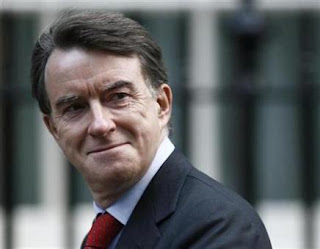 Article from today's Sunday Herald Newspaper - BUSINESS COMMENT: By Robert McDowell
Article from today's Sunday Herald Newspaper - BUSINESS COMMENT: By Robert McDowellWHEN THE Belgian bank Fortis was taken over in October, board members could not appear in public without risking violent abuse, such was the blow to national pride of the bank's collapse. Should it be different for our banks? Friday's demise of HBOS is a profound blow to Scotland's national economic pride and the political fallout will remain active for a long time yet.
If, in the final act of this drama, the Merger Action Group (MAG) had won referral of the merger to the Competition Commission (CC), as the Office of Fair Trading (OFT) recommended, the takeover would have been prevented. But after losing the case last Wednesday, MAG gracefully declined to appeal.
Rank-and-file staff of both HBOS and LLoyds won't share their boards' satisfaction with Friday's result. Possibly more than 20,000 will lose their jobs, north and south of the Border. Not a very material consideration, if you agree with the business secretary the noble Baron Mandelson of Hartlepool, who, without fear or favour, weighed in the balance competition law and banking stability.
Or did he? Let us re-create the day - October 30 - when Mandelson weighed in the balance the fate of a 300-year-old Scottish bank. Outside his Whitehall window thousands of "No Pay Day" protesters were calling for an end to the gap between men and women's wages. His Lordship had just returned from a four-day trip to Russia (politically embarrassing given his Corfu connections). On that day Russia moved 2000 troops into South Ossetia, unsettling timing for the Baron, considering he had just returned from cultivating East-West relations.
As his diary also required him to speak alongside Chancellor Darling and European Investment Bank president Philippe Maystadt at London's Guildhall, urging banks to honour loan commitments to small firms, can we conclude that his mind was not fully on the HBOS merger?
Evidence given to last week's tribunal by a Mr Saunders, a civil servant, stated: "On the afternoon of October 30, the Secretary of State met with officials to discuss the advice and submissions he had received and to reach a decision. At our request, officials from HM Treasury were also present in case he had any specific further questions about the evidence of the Tripartite Authorities relating to the implications of the merger for financial stability. Having satisfied himself that all the evidence and options had been fully examined, the Secretary of State reached the decision, in line with our recommendation and on the basis of the arguments set out in the submission dated October 28, 2008, not to refer the merger to the Competition Commission."
There was much to consider, but I suspect that the meeting on such a busy day was kept snappy. Saunders doesn't say if the minister asked any "specific questions".
MAG argued last week that the law strictly obliged Mandelson to reach a decision "with an open mind", and that this was impossible when the chancellor and prime minister had, in repeated statements to the media, firmly committed the government to not referring the merger. To do so would have scuppered the merger.
As noted in the panel's conclusions: "The evidence is, therefore, all one-way and there is simply no basis for the allegation that the issue of the continuing need for the merger was not properly considered by the decision-maker." But how was it that "all the evidence and options had been fully examined" if, as seems reasonable to speculate, no detailed counter-arguments were explained to Mandelson that day?
The key question is: was the minister "fettered"? Prima facie, he was. His bosses had already publicly decided the issue. There were also the "tying" conditions in the takeover bid or merger agreement.
And, having enacted a change to the law days earlier, and only receiving one-sided advice in the context of vague fears for future financial market stability, where was he allowed latitude "to examine all the evidence and options"? The answer is: nowhere.
Imagine the media derision should Mandelson have performed a U-turn and referred the merger to the CC. It is scarcely conceivable that he could have contradicted and embarrassed his political colleagues who had rushed through legislation the week before.
The MAG judgement is about "lawfulness", not "correctness". But, for the noble Baron's decision to be lawful it absolutely must be "unfettered". The sublime manner in which the judges concluded he was "unfettered" is sheer legal escapology.
How can anyone seriously imagine the secretary of state's decision had not already been made for him by others? If the Baron was not mentally "fettered", he was surely corralled up a one-way street.
To many, the fate of the Bank of Scotland will be just another addition to the butcher's bill of the credit crunch. But in Scotland it cuts to the heart of what our small nation is all about.
On HBOS's former headquarters on the Mound stands the gilded figure of Victory. The hollow statue, was cast in spelter (a form of impure zinc) exactly 200 years ago, at a time of new prosperity and pride in Scotland, coinciding with the epochal visit of King George IV.
Thatvisit was hosted by Sir Walter Scott, who later defended the Scottish banks against Bank of England encroachment. He appealed ingeniously to the binding clause in the Treaty of Union whereby no decision by Westminster affecting private interests is binding on the people of Scotland unless it is demonstrably to their benefit. Where was Sir Walter, a true Scot, when we needed him?

No comments:
Post a Comment